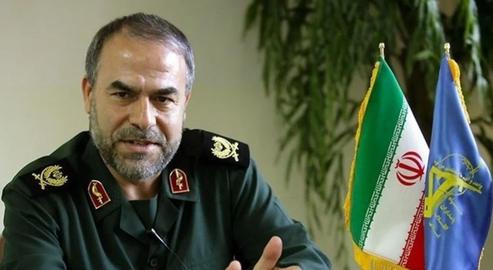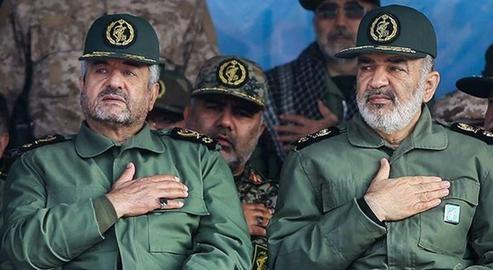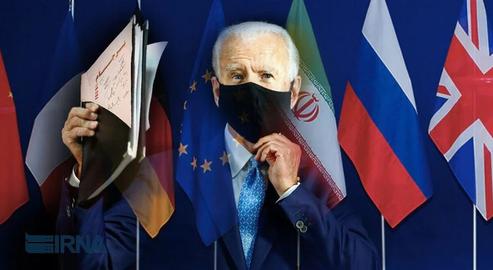In an interview with Fars News Agency on April 4, Commander Yadollah Javani, head of the political bureau of Iran’s Islamic Revolutionary Guard Corps (IRGC), said the IRGC opposed its members entering the electoral arena without going through the necessary legal steps first.
He added that Saeed Mohammad, who was in charge of Khatam Al-Anbia Headquarters, had been dismissed due to violations of the rules. Mohammad wrote to the IRGC’s commander-in-chief last March to tender his resignation due to the possibility of running in the presidential election, which is slated to take place on June 18.
Some social media users called Javani’s remarks the result of internal rivalry pitting Hossein Salami, the current IRGC commander, against Mohammad Ali Jafari, the former IRGC commander. What is the background to this confrontation?
***
Yadollah Javani, the political head of the Revolutionary Guards, has said his organization is "opposed to the entry of its forces into the election arena" without going through the defined legal processes. Saeed Mohammad, he added, had been dismissed for failing to do this.
Hours later Mohammad's office announced that Javani was not a spokesperson for the Revolutionary Guards and that his remarks were “personal” in nature. Meanwhile, despite this internal scuffle and the accusations against Mohammad, Rostam Ghasemi, the economic head of the IRGC's Quds Force, is continuing his electoral campaigning without resigning, and the IRGC has not raised a grievance against him for doing so.
Unprecedented Tensions Within the IRGC
This kind of confrontation, between Revolutionary Guards commanders and an ex-IRGC candidate backed by Basij paramilitary forces and the IRGC itself, is unprecedented. In recent weeks videos of Mohammad's supporters threatening consequences for his dismissal by the Guardian Council have also surfaced online.
In effect, one of the candidates, who could have been a shining example of the type of "young revolutionary" long espoused as desirable by the Iranian Supreme Leader, has been hit hard.
The dispute between Javani and Mohammad can be read as a symptom of the dispute between Mohammad Ali Jafari and Hossein Salami, the former and current commanders of the Revolutionary Guards. Mohammad had his formative years of service during Jafari’s tenure, and his supporters in the IRGC were also close to Jafari.
Some of the activities in favor of Mohammad's candidacy were also carried out under the command of the Baghiatolah Cultural Headquarters of the Revolutionary Guards, which is headed by Jafari.
Javani was fired from the position of IRGC political chief during the leadership of Jafari and returned to this position in 2017 with the change of the Supreme Leader’s representative in the Revolutionary Guards. Prior to Javani's speech, there were reports that some of Mohammad's relatives at the Khatam al-Anbia Headquarters had been arrested on corruption charges.
Previously Hamid Reza Taraghi, a member of the Central Council of the Islamic Coalition [Mo'talefeh] Party, said Mohammad had been fired from his command over the Khatam al-Anbiya Headquarters because of his violations.
No Consensus on a Conservative Candidate
Since this conflict broke out, Mohammad is no longer the Revolutionary Guards’ favourite candidate in the election, though he still enjoys support among the Basij. The names of several others have come to light since then. The current Speaker of the Iranian parliament, Mohammad Baqer Ghalibaf, former defense minister Hossein Dehghan and Expediency Council secretary Mohsen Rezaei are among the ex-IRGC officers who have equal chances of being nominated as the principal candidate.
Currently Ghalibaf has received the most public support. But he may not be the final candidate endorsed by Revolutionary Guards commanders. The role of Iran’s Chief Justice Ebrahim Raeesi in the election is not yet clear: he also has a stab at being introduced as the candidate of choice for the principalist factions.
Former nuclear negotiator Saeed Jalili is also still being considered as a possible candidate. He could in turn be supported by some of the Basijis and the Revolutionary Guards, as well as some extremist groups.
Another frontrunner is the former head of Islamic Republic of Iran Broadcasting Ezatollah Zarghami, who has tried to present himself as a more moderate figure and with an appeal that extends beyond the conservatives. But other figures with a broad appeal such as Mohammad Mokhber, the head of the Committee for the Execution of Imam Khomeini's Order, may also join the list of nominees in coming weeks.
President of the Supreme Audit Council Mehrdad Bazarpash, MP and former Transport Minister Ali Nikzad and President of the Islamic Revolution Mostazafan Foundation Parviz Fattah have also previously been mentioned as possible candidates. Among the diverse list of conservative candidates, however, with the exception of Ebrahim Raeesi, there is still no individual who stands out or enjoys broad consensus that they have a fighting chance.
High-Profile Reformist Candidates
The so-called reformist faction has also created the Reform Front of Iran, known as NASA, for the presidential election, but has not yet nominated a candidate. Foreign Minister Mohammad Javad Zarif has repeatedly insisted he will not run himself, but whether this turns out to be true or not is likely to only be borne out in the final days of registration.
By contrast, Sadegh Kharazi, who was deputy foreign minister in Mohammad Khatami's government, has been going on provincial trips for some time now and deploying acid critique of President Hassan Rouhani's administration in his speeches.
Meanwhile the chairman of Tehran City Council, Mohsen Hashemi Rafsanjani, and Vice President Eshagh Jahangiri are also prominent candidates. But the Guardian Council’s confirmation of Rafsanjani is in doubt, while Jahangiri was nominated in 2017 but ended up dropping out of the election.
Former Speaker of Parliament Ali Larijani has been repeatedly mentioned as a possible reformist candidate, but he has always had trouble acquiring votes in the past.
Former Health Minister Hassan Ghazizadeh Hashemi has already been nominated, but his candidacy has yet to be taken seriously. The names of Energy Minister Reza Ardakanian and Petroleum Minister Bijan Namdar Zanganeh have also been suggested.
Information Minister Mohammad-Javad Azari Jahromi has always been supported by the president’s Chief of Staff Mahmoud Vaeziand and other members of the government as a possible frontrunner. Former First Vice President Mohammad Reza Aref is also a potential candidate. Former Minister of Housing Abbas Akhoundi could also stand, but he eventually left the government in an atmosphere of resentment and has virtually no support from Rouhani.
In addition to the Reform Front of Iran, former President Mohammad Khatami and the incumbent Rouhani will also play an important role in determining the reformists’ final candidate.
Former President Mahmoud Ahmadinejad is also still seeking candidacy for himself or his close friends. One key problem, however, is that his First Vice President Esfandiar Rahim Mashaei and the head of his Presidential Administration Hamid Baghaei, his two closest allies, are in prison. Apart from them, no-one in Ahmadinejad's inner circle appears to be willing to step up.
The Islamic Coalition Party has also stated its intention to run independently since the 2017 election; former MP Assadollah Badamchian has been proposed as the party's candidate.
Some think the 2021 presidential election will be similar to the 2005 election, with an increased variety of candidates and a reduced turnout. However, it is the Guardian Council and the Supreme Leader who will ultimately determine the list of names on the ballot.
Related coverage:
IranWire Exclusive: Javad Zarif is “Frustrated” With the Guards and Government
Uncertain Future for Nuclear Deal as Rouhani’s Presidency Comes to an End
visit the accountability section
In this section of Iran Wire, you can contact the officials and launch your campaign for various problems



























comments